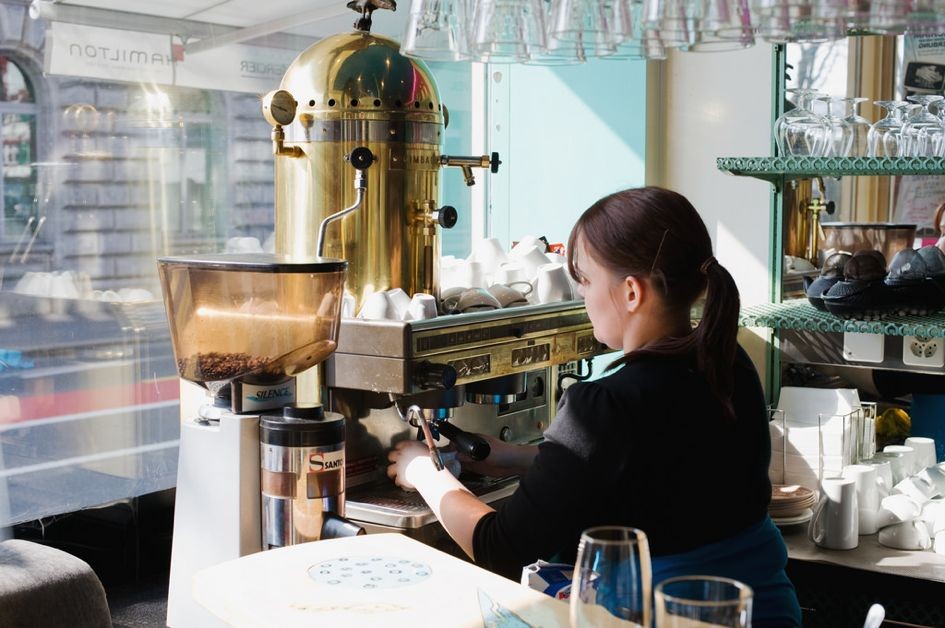In yet another sign that many types of jobs will soon be replaced by automation, a new cafe in San Francisco is using a robotic system to replace human baristas. Cafe X was first launched in Hong Kong, and is now serving gourmet coffee stateside, from a kiosk featuring a very advanced robotic arm fueled not by caffeine but by new technologies. Customers can send their order via their phones or a kiosk screen, and in less than a minute, the robotic arm can expertly prepare a coffee drink for them. Reviews of the machine's beverage skills have been high, and the use of technology avoids some of the human-based mistakes and inefficiencies that are sometimes unavoidable when another person is involved in the process.
We've written before about how technological advances may soon change the way Americans work, forever eliminating many jobs that most people take for granted as needing to be performed by humans. Self-driving cars seem certain to completely replace human-piloted vehicles within a few decades, and will likely take millions of delivery, trucking and other driving-related jobs with them. With self-checkouts reducing the number of people needed to work cash registers at many stores, it seems as if it's only a matter of time before fewer and fewer humans are doing those types of jobs too.
It seems like the friendly barista at a neighborhood coffee shop might eventually go the way of the dodo too; the automated coffee kiosks are reliable and efficient in ways that no human can consistently match, and reportedly serve up a mean cup of Joe. It's not just Cafe X in San Francisco that's testing these types of human-replacing technologies either; four years ago, a different type of automated gourmet-coffee-making kiosk appeared in a common area at The University of Texas in Austin. Briggo is a wood-paneled contraption that takes up only about 50 feet and is manufactured in Austin, where the company hopes to carve out a niche for its vision of automated kiosks competing for the business of discerning, tech-savvy coffee drinkers.
The advantages to these types of systems are numerous, as higher efficiency and less waste allow them to dispense drinks more quickly and for less money than an actual barista could consistently match. As with all forms of automation, there are fewer human-related hiccups for businesses using them; they don't have to provide sick days or health insurance to a robot. But there is one factor that might be insurmountable for the foreseeable future, and that's the social aspect of a good coffee shop. A lot of people enjoy the atmosphere and human element of cafes, and it's hard to imagine that a shop manned by robots would be able to cultivate the same sort of clientele. A barista friend of mine brought up a related point, saying, "This neglects to consider the fact that 25-40 percent of cafe customers only come in because they have a barista fetish. Ain't no way a robot is going to out-sexy me."
So far, the uncanny valley keeping human-like robots creepy isn't likely to be bridged anytime soon, so perhaps coffee shop employees who use good looks and charm to win over repeat customers will still manage to compete against Cafe X and Briggo. Bearing these things and others in mind, not everyone is convinced that automated coffee technologies will replace baristas anytime soon.
Still, it's easy to imagine certain scenarios where the human-less gourmet coffee technologies could flourish. They'd certainly be preferable to the old-fashioned coffee-vending machines, and could be popular in locations where speed and space is a concern; it's doubtful that a person trying to get a latte between flights in a crowded airport would miss a smiling barista much.
Whether or not Cafe X and Briggo prove to have the lasting appeal needed to succeed in the marketplace is unclear, but the automated technology that both rely on is here to stay, and will probably threaten or eliminate many of the types of food- and beverage-related jobs that people perform now. This is a trend that will continue to grow, leaving some to wonder what will happen when millions of people no longer can find work. Is it possible or desirable to slow the spread of automation in some way? If it's not, then is it realistic to believe that people whose jobs will be eliminated can be trained to do other types of work? We're in for some major changes in the workplace over the next ten or 20 years, but at least coffee is here to stay.
Support Us
Houston's independent source of
local news and culture
account
- Welcome,
Insider - Login
- My Account
- My Newsletters
- Contribute
- Contact Us
Are Barista-Replacing Coffee Robots Another Sign of Permanently Disappearing Jobs?

Are baristas going to be replaced by machines soon?
[
{
"name": "Related Stories / Support Us Combo",
"component": "11591218",
"insertPoint": "4",
"requiredCountToDisplay": "4"
},{
"name": "Air - Billboard - Inline Content",
"component": "11591214",
"insertPoint": "2/3",
"requiredCountToDisplay": "7"
},{
"name": "R1 - Beta - Mobile Only",
"component": "12287027",
"insertPoint": "8",
"requiredCountToDisplay": "8"
},{
"name": "Air - MediumRectangle - Inline Content - Mobile Display Size 2",
"component": "11591215",
"insertPoint": "12",
"requiredCountToDisplay": "12"
},{
"name": "Air - MediumRectangle - Inline Content - Mobile Display Size 2",
"component": "11591215",
"insertPoint": "4th",
"startingPoint": "16",
"requiredCountToDisplay": "12"
}
,{
"name": "RevContent - In Article",
"component": "12527128",
"insertPoint": "3/5",
"requiredCountToDisplay": "5"
}
]

